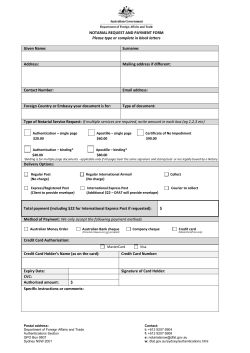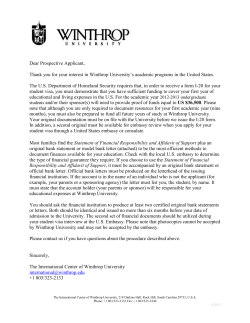
Client Alert English Contract Law: Your Word May Still be Your Bond
Client Alert Client Alert Litigation Litigation March 13, 2014 English Contract Law: Your Word May Still be Your Bond Oral contracts are alive and well – and enforceable. By Raymond L. Sweigart American movie mogul Samuel Goldwyn is widely quoted as having said, ‘A verbal contract isn’t worth the paper it’s written on.’ He is also reputed to have stated, ‘I’m willing to admit that I may not always be right, but I am never wrong.’ With all due respect to Mr Goldwyn, he did not have this quite right and recent case law confirms he actually had it quite wrong. English law on oral contracts has remained essentially unchanged with a few exceptions for hundreds of years. Oral contracts most certainly exist, and they are certainly enforceable. Many who negotiate commercial contracts often assume that they are not bound unless and until the agreement is reduced to writing and signed by the parties. However, the courts in England are not at all reluctant to find that binding contracts have been made despite the lack of a final writing and signature. Indeed, as we have previously noted, even in the narrow area where written and signed contracts are required (for example pursuant to the Statute of Frauds requirement that contracts for the sale of land must be in writing), the courts can find the requisite writing and signature in an exchange of emails. 1 As for oral contracts, a recent informative example is presented by the case of Rowena Williams (as executor of William Batters) v Gregory Jones (25 February 2014) reported on Lawtel reference LTL 7/3/2014 document number AC0140753. There the executor of the estate of a deceased minority shareholder brought suit to enforce an agreement by the decedent to sell his shareholding to the majority shareholder. The Judge held that an oral agreement for such a transaction was complete and binding despite the intent of the parties that their agreement should be recorded in a formal written document that 1 In our January 2011 article, King Charles II Meets the Digital Age: Can an Email Chain Satisfy the Statute of Frauds?, we discussed the English High Court judgment in Golden Ocean Group Ltd v Salgaocar Mining Industries PVT Ltd. [2011] EWHC 56 (Comm) and its guidance for parties negotiating contracts via email as to the enforceability of a contractual guarantee under section 4 of the Statute of Frauds 1677. We further noted affirmance by the Court of appeal at [2012] EWCA Civ 265 in our March 2012 article, UK Appeal Court Agrees: Serial Emails Can Create a Contract Satisfying Statute of Frauds. Pillsbury Winthrop Shaw Pittman LLP www.pillsburylaw.com | 1 Client Alert Litigation they were to sign. Since the parties had not evidenced the clear intention that their oral agreement should be ‘subject to contract,’ a formal signature on a written contract was not required. Somewhat similarly, last year in Newbury v. Sun Microsystems [2013] EWHC 2180 (QB), an application was brought for a declaration that a claim and counter-claim were compromised on the terms set out in certain correspondence. The Claimant argued that a binding agreement was reached when the Defendant offered to settle on certain terms and those terms were accepted by letter. The Defendant countered that their letter merely made an offer in principle, that the parties still had to negotiate other terms and conditions and that, in any event, any settlement was to be recorded in a suitably worded agreement and, until such a written agreement was executed, there was no binding contract. Of particular significance, the letter was not expressed to be ‘subject to contract.’ Had those words been used, the Judge felt it would have been clear that the terms were not yet binding absent a formal contract. The Judge found that the Defendant’s failure to use those words in the letter indicated that it was an offer of terms capable of acceptance as it stood. It was not intended to be subject to discussion and agreement on additional or different terms. Air Studios (Lyndhurst) Limited T/A Entertainment Group v Lombard North Central PLC [2012] EWHC 3162 (Q.B.) helpfully sets out the legal principles involved as follows: In deciding whether the parties have reached agreement, the whole course of the parties’ negotiations must be considered and an objective test must be applied: Chitty on Contracts, 31st edition (2012), Vol 1, paras 2-028 and 2–029. Once the parties have to all outward appearances agreed in the same terms on the same subject matter, usually by a process of offer and acceptance, a contract will have been formed. The subjective reservations of one party do not prevent the formation of a binding contract. Further, it is perfectly possible for the parties to conclude a binding contract, even though it is understood between them that a formal document recording or even adding to the terms agreed will need to be executed subsequently. Whether they do intend to be bound in such circumstances, or only as and when the formal document is executed, depends on an objective appraisal of their words and conduct. These principles are well established. They were summarised, for example, by Lord Clarke giving the judgment of the Supreme Court in RTS Flexible Systems Ltd. v Molkerei Alois Muller GmbH [2010] UKSC 13, [2010] 1 WLR 735 at [45]: ‘The general principles are not in doubt. Whether there was a binding contract between the parties and if so, upon what terms depends upon what they have agreed. It depends not upon their subjective state of mind, but upon a consideration of what was communicated between them by words or conduct, and whether that leads objectively to a conclusion that they intended to create legal relations and had agreed upon all the terms which they regarded or the law requires as essential for the formation of legally binding relations. Even if certain terms of economic or other significance have not been finalised, an objective appraisal of their words and conduct may lead to the conclusion that they did not intend agreement of such terms to be a precondition to a concluded and legally binding agreement.’ Lord Clarke went on at [49] to set out the well-known summary of the relevant principles by Lloyd LJ in Pagnan SpA v Feed Products Ltd. [1987] 2 Lloyd’s Rep 601 at 619, adding that the same principles apply where the question is whether a contract was concluded in correspondence as well as by oral communications and conduct: Pillsbury Winthrop Shaw Pittman LLP www.pillsburylaw.com | 2 Client Alert Litigation 1. In order to determine whether a contract has been concluded in the course of correspondence, one must first look to the correspondence as a whole…. 2. Even if the parties have reached agreement on all the terms of the proposed contract, nevertheless they may intend that the contract shall not become binding until some further condition has been fulfilled. That is the ordinary ‘subject to contract’ case. 3. Alternatively, they may intend that the contract shall not become binding until some further term or terms have been agreed…. 4. Conversely, the parties may intend to be bound forthwith even though there are further terms still to be agreed or some further formality to be fulfilled…. 5. If the parties fail to reach agreement on such further terms, the existing contract is not invalidated unless the failure to reach agreement on such further terms renders the contract as a whole unworkable or void for uncertainty. 6. It is sometimes said that the parties must agree on the essential terms and it is only matters of detail which can be left over. This may be misleading, since the word ‘essential’ in that context is ambiguous. If by ‘essential’ one means a term without which the contract cannot be enforced then the statement is true: the law cannot enforce an incomplete contract. If by ‘essential’ one means a term which the parties have agreed to be essential for the formation of a binding contract, then the statement is tautologous. If by ‘essential’ one means only a term which the Court regards as important as opposed to a term which the Court regards as less important or a matter of detail, the statement is untrue. It is for the parties to decide whether they wish to be bound and if so, by what terms, whether important or unimportant. It is the parties who are, in the memorable phrase coined by the Judge [at page 611] ‘the masters of their contractual fate.’ Of course the more important the term is the less likely it is that the parties will have left it for future decision. But there is no legal obstacle which stands in the way of the parties agreeing to be bound now while deferring important matters to be agreed later. It happens every day when parties enter into so-called ‘heads of agreement.’ The fourth of these principles was already well established by the time of Parker J’s judgment in Von Hatzfeld-Wildenburg v. Alexander [1912] 1 Ch 288. Parker J said at 288: ‘It appears to be well settled by the authorities that if the documents or letters relied on as constituting a contract contemplate the execution of a further contract between the parties, it is a question of construction whether the execution of the further contract is a condition or term of the bargain or whether it is a mere expression of the desire of the parties as to the manner in which the transaction already agreed to will in fact go through. In the former case, there is no enforceable contract either because the condition is unfulfilled or because the law does not recognise a contract to enter into a contract. In the latter case, there is a binding contract and the reference to the more formal document may be ignored.’ I refer also to the helpful summary by Andrew Smith J in Bear Stearns Bank plc v Forum Global Equity Ltd. [2007] EWHC 1576 (Comm) at [171]: ‘The proper approach is, I think, to ask how a reasonable man, versed in the business, would have understood the exchanges between the parties. Nor is there any legal reason that the parties should Pillsbury Winthrop Shaw Pittman LLP www.pillsburylaw.com | 3 Client Alert Litigation not conclude a contract while intending later to reduce their contract to writing and expecting that the written document should contain more detailed definition of the parties’ commitment than had previously been agreed.’ More recently, this principle was applied by the Court of Appeal in Immingham Storage Company Ltd. v Clear Plc [2011] EWCA Civ 89, 135 Con LR 224. The facts there were particularly compelling that the parties intended to be bound notwithstanding the contemplation that a formal contract would be signed in due course. The parties had reached express agreement in writing as to the application of one party’s standard terms and conditions; certain subjects (board approval and tank availability) which had previously been stipulated had been lifted; the defendant had been expressly assured of the availability of the tank space in question and that it could now proceed to source its product; and the reference to a formal contract to be sent was stated to be in confirmation of what had been agreed. Giving the judgment of the court, David Richards J at [19] and [25] contrasted these factors with a case where agreement was stated to be subject to contract or subject to execution of a formal agreement, and observed that they pointed overwhelmingly to an intention to create a contract. He added: ‘Set against those factors, the provision that a “formal contract will then follow in due course” does not indicate that the claimant’s acceptance of the signed quotation will be no more than an agreement subject to contract.’ The obvious practical lesson here is that, in negotiating contracts subject to English law, unless and until a party is ready in all respects to enter into a binding agreement, all written communications relating to negotiations and contractual terms should be consistently described as ‘subject to contract.’ One acts at its peril in disregarding this step as an antiquated or unnecessary formality. 2 If you have any questions about the content of this alert, please contact the Pillsbury attorney with whom you regularly work, or the author below. Raymond L. Sweigart (bio) London +44.20.7847.9607 raymond.sweigart@pillsburylaw.com 2 Our April 2013 article, ‘Subject to Contract’ Documents Defeat English Law Claim of Partnership at Will, discusses Valencia v. Llupar, [2012] EWCA Civ 396, where the Court of Appeal for England and Wales rejected an argument that a partnership at will or in fact had been created between the parties, the defendant’s solicitors having marked correspondence regarding the proposed partnership agreement as ‘subject to contract.’ As a result, the defendant had to repay to claimant £80,000 he had invested in the proposed venture on the grounds of unjust enrichment, plus interest and costs. This publication is issued periodically to keep Pillsbury Winthrop Shaw Pittman LLP clients and other interested parties informed of current legal developments that may affect or otherwise be of interest to them. The comments contained herein do not constitute legal opinion and should not be regarded as a substitute for legal advice. © 2014 Pillsbury Winthrop Shaw Pittman LLP. All Rights Reserved. Pillsbury Winthrop Shaw Pittman LLP www.pillsburylaw.com | 4
© Copyright 2025





















